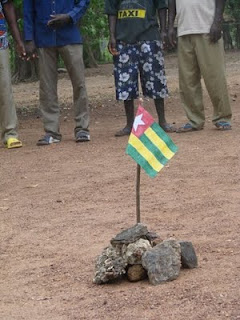
Fridays are always a busy day for the organizers in charge of logistics at Camp UNITE.
One of the best things about camp is the chance to get young people and Togolese professionals together from all over the country.
But it can also be a logistical nightmare.
Trying to figure out how many cars we need to rent, bargaining with the taxi trade association, handing out extra transportation money…
With our budget constraints we can’t rent whole cars, we pay per place in the cars, which means we have to rely on the drivers to be nice and willing to be flexible. This takes some convincing (and sometimes extra t-shirts to make them happy).
And the participants and counselors that go all the way north… They have the toughest time. The drivers pretty much refuse to go north of Kara (which is the capital city of the region of Kara). It’s another 3 hours to get to the capital city of the region of Savannes, north of Kara, and we have to figure out a way to get everyone all the way there.
Transportation in Togo is not like transportation in the developed world. There is literally one 2-lane highway that runs up the center of the country. With the lack of infrastructure and capital, the government has never made the investment to ensure the durability of the road. Someone explained to me that major highways in the states are about 3 feet thick- layers of gravel and asphalt that getter finer as they reach the surface, with a final layer of tar to get it all to stick together.
In Togo, they wet the dirt and press it down.
Okay, there are some places where there’s a few inches of gravel and a layer of asphalt and tar. But the rainy season seeps through those few inches, erodes away the dirt, and creates potholes larger than the overloaded trucks.
It’s a tough road. It requires patience, good humor and a strong commitment to arriving at your destination.
Today we talked about objectives and leadership. An apprentice who participated in camp last year came back this year as a jeune leader. He explained that when he arrived back home, he had a tough time explaining to his community what he had learned at camp.
“My mother asked me for the money that I had gotten at camp. I tried to explain that I didn’t receive money, I received information. She didn’t understand. So I set my alarm for really early in the morning and I got up before my mother and I started sweeping the compound. She woke up and saw me and she laughed at me. She thought that I was just really excited about camp and would give it up soon. But I didn’t. I set my alarm early every morning and I get up and I sweep. She understands now that what I received is more valuable than money.”
Trying to change gender roles in Togo is very difficult – girls and women are in charge of sweeping, cleaning, cooking food, gathering water. This means that girls have less time to study for school, are late going to their apprenticeships, and don’t have the time to do income-generating activities.
This is why it is so important to get young men to take responsibility for gender equity. Without the buy-in and active participation of young men, young women cannot succeed.
The young men who participate in the camp for boy apprentices emerge as young leaders. With patience, good humor and persistence, they can start down the road to change people’s ideas and behaviors.
Want to try out some activities that engage men in gender equity and community change? Check out Engender Health’s Men As Partners curriculum. It’s a fantastic resource that we’ve integrated into our work at Camp Unite.
Donate to The Unite Foundation – we’ve still got $3000 more to raise before student camps in July!

No comments:
Post a Comment